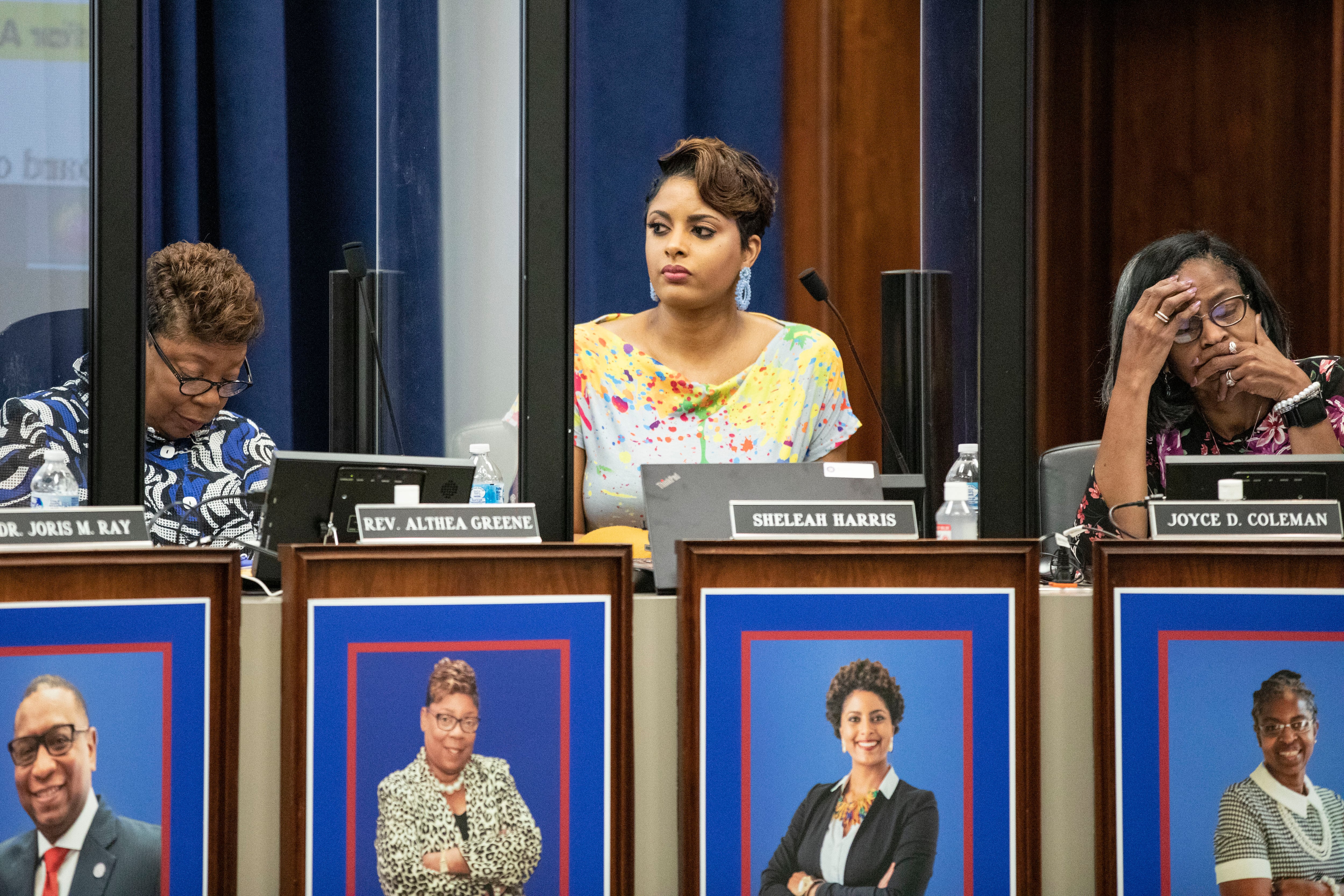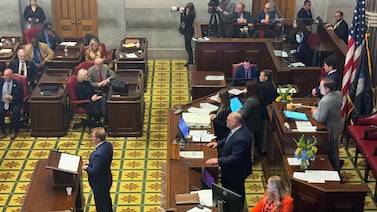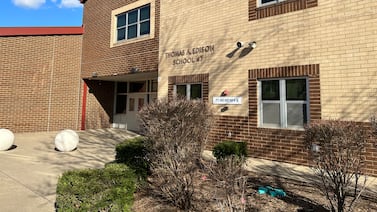Sign up for Chalkbeat Tennessee’s free daily newsletter to keep up with Memphis-Shelby County Schools and statewide education policy.
Memphis-Shelby County Schools paid a lawn care vendor more than its contract allowed, lost some lawn equipment to theft, and paid an employee for days they didn’t work.
The lapses surfaced in a regular independent financial audit of the district for the 2021-22 school year and were detailed in a report shared with state officials in January. The findings prompted personnel changes and a reorganization of the district’s procurement department, a Chalkbeat review of public records shows.
Interim Superintendent Toni Williams announced some of those changes last fall, soon after she was appointed to take the place of Joris Ray, who resigned as superintendent under a cloud of scandal. The actions drew praise from board members and community advocates as a fresh sign of accountability from the new district leader.
But Williams’ decision to pursue the permanent superintendent post, after promising not to, has roiled the search for Ray’s successor, and sparked new scrutiny of the way the district does business.
When school board Vice Chair Sheleah Harris resigned unexpectedly from her post last week, she called for a district audit “going back at least 5 years” to root out what she claimed was widespread corruption. She cited conflicts of interest in contract awards and misuse of philanthropic funds.
Such allegations are not new, and the district has repeatedly faced calls for audits from critics of its leadership and financial management, even though the district’s finances are audited regularly. In the case of Harris’ allegations, some of the issues she raised appear to mirror the ones addressed by the most recent audit.
The personnel and procurement changes Williams made “are part of ongoing efforts to improve efficiency and transparency,” the district said in a statement responding to Harris’ sweeping allegations.
The latest independent audit, by accounting firms Watkins Uiberall PLLC and Banks, Finley, White, & Co., spanned the period from July 2021 to June 2022. During that period, Williams was the district’s chief financial officer under Ray.
More audit findings about the district may be forthcoming. In addition to the changes Williams announced last fall, district officials hired an auditor to look into potential fraud or noncompliance in managing its $775 million in federal pandemic relief funds, records show. The district did not respond to requests for an update on the status of that audit.
Lawn service contract drew scrutiny from auditors
After her resignation Tuesday, Harris directed reporters to probe her claims, but she declined Chalkbeat’s request for documents supporting her allegations, and wrote that she would not answer further questions.
In her statements following her resignation, Harris suggested there were irregularities with vendor contracts that were worth less than $100,000 — a threshold that requires board approval — saying some were “direct conflicts.”
The district has spent this school year correcting issues related to that policy and strengthening controls, records show.
During the 2021-22 school year, Isaac Wright, an employee who oversaw the district’s grounds and cleaning services, approved payments to a lawn company beyond allowances in the contract. Those payments exceeded the $100,000 threshold, meaning they would normally have warranted a board vote. Details are reflected in the audit report the district regularly files to the state, plus internal audit documents obtained by Chalkbeat through a public records request.
The lawn company submitted invoices in the beginning of August 2021, as the district was preparing to reopen school buildings after a year of online learning. Wright told the district that he paid the company because of pressure from a district official “to get all properties cut before schools’ reopening,” according to the internal report.
The district official, business operations chief Genard Phillips, had told Wright that the contract expansion could be taken to the board for “after the fact” approval, internal auditors wrote. The MSCS board later approved an expansion to the contract, public records show. (The vendor, Supreme Lawn Care, has an active contract with MSCS.)
The internal audit report said Phillips “exceeded his authority” with those instructions. Phillips resigned from MSCS late last year, and his personnel file does not include any internal investigations related to the audit. But his departure and replacement were recorded in the audit report filed with the state as a corrective measure to improve the ethics and accountability of district processes.
“I didn’t authorize (Wright) to do anything that would have been outside of board policy,” Phillips told Chalkbeat, adding that he did not dispute any of the findings in the audit report filed with the state.
Wiiliams appointed Phillips’ successor, Julius Muse, in October 2022. Muse would also oversee a new procedure for monitoring district inventory, according to the state report, which found that some lawn equipment had been stolen.
Auditors also found that Wright violated the district’s “vague” conflict-of-interest policy on gifts by accepting tickets to Grizzlies basketball games and other sporting events from cleaning vendors. The vendors at the time — ServiceMaster Stratos and SKB Facilities, plus former subcontractor Action Chemical — told auditors they were not aware of the district’s policy, and regularly gave tickets to all customers.
Wright was put on leave last fall. While MSCS told auditors he was terminated, Wright said — and his personnel file shows — that he resigned, shortly after the internal audit report was complete.
“I never abused my position,” Wright told Chalkbeat.
Department restructuring targeted conflicts of interest
Among other allegations in her statements, Harris questioned a subsequent restructuring that shifted the procurement department from business operations to finance.
According to the audit, that was done “to provide more fiscal oversight and independence from operations.” Several staff received training to avoid conflicts of interest, and the district planned to strengthen procurement policies and procedures.
The audit also found that a senior employee — who was assigned to review payroll for part of their department — received unowed payment during vacation time, of about $1,000. MSCS responded by requiring direct supervisors and department heads to review payroll, the audit shows.
Documents about these matters are addressed to the members of the board and the school board chair. Since their publication, the findings have not appeared to be part of public discussions by the body. MSCS did not respond to a Chalkbeat request for confirmation of this.
Laura Testino covers Memphis-Shelby County Schools for Chalkbeat Tennessee. Reach Laura at LTestino@chalkbeat.org.







